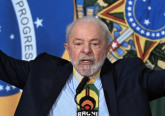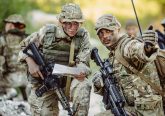In a farewell speech to Colombia’s armed forces last year just prior to leaving office, ex-president Juan Manuel Santos boasted: “Today we have the best armed forces in our history.” Proudly, he added: “We’re a global reference!” And indeed, it seems as though Colombia had opened a new chapter. Since the 2016 peace accords with the country’s largest guerrilla organisation, the FARC (Revolutionary Armed Forces of Colombia), the nation appears to be on an uphill climb.
With the FARC at the negotiation table, the story goes, the country was finally able to look ahead and dedicate its resources to transition and reconstruction: the reintegration of former combatants, the redistribution of formerly occupied territories, and the recovery of an economy weakened by decades of violence and corruption.
Colombia has managed to convince an international audience of its supposed 180- degree-turn — away from its image as a world champion of cocaine exports and one of Latin America’s guerrilla hotspots. In its stead, Colombia has carefully crafted and rigorously rehearsed the image of security expert —a state able to train other states with less experienced security institutions in police and military skills. But a closer look at the creation of Colombia’s new export product shows that there is more to this than a simple success story.
Creation of a new export good
Colombia’s new export good is security expertise: the offer to train police and military units of other countries in skills such as jungle combat, urban counternarcotics, or maritime interdiction. Since 2012, Colombia has signed several so-called “triangulated security agreements” (e.g. Tickner 2014) in which a third party (primarily Canada and the US) acts as sponsor paying for training sessions for countries such as Honduras, Guatemala, and El Salvador (the countries of the Northern Triangle), but also Ghana and other West African nations on the drug-trafficking routes to Europe.
For sponsors, this is a low-cost, low-risk foreign policy opportunity while for Colombia this is a welcome springboard of image change. For the security practitioners receiving the training, it is the kind of cost-free offer that is hard to turn down. But how credible is the success story on which Colombia’s new status claim is based?
Since Santos served his first term as president a lot has changed — certainly with regards to the armed conflict. The 2016 peace accord with the FARC was a successful end to several years of negotiations in Havana. Notwithstanding, two recent developments have slowed down progress: first, the peace agreement was rejected by popular referendum; second, the right-wing government of Iván Duque, in the shadow of “eternal ex-president” and staunch militarist Álvaro Uribe, has revived the politics of confrontation. Whether any of this means a return to old times remains subject to debate, but it does indicate Colombia’s new international image may be premature.
Quid pro quo?
Whether imagined or real, the notion of a “Colombian comeback” is alive and well. But who dictates its terms? To Canada and the US, the triangular agreements with Colombia are obviously attractive: the powers of the North are able to maintain face and keep political costs at a low (by contrast with e.g. direct US meddling with Central and South American politics in the past) by leaving law and order to a trusted ally. To Central America’s receiving countries, there is simply the attractive offer of free police and military training by self-proclaimed experts.
But what is Colombia’s motive? National security is an unlikely candidate — even though classical theories of international relations might take this motive as a starting point. On this rationale, Colombia would be addressing some external danger to its own stability — only in this case, security threats (the narcotics trade in particular) flow away from, not into, Colombia. The benefits to Colombia are thus not immediately clear. Given that that the country’s security resources are largely occupied with ongoing violence, it is puzzling that Colombia can actually afford to send some of its top officers on training trips to Guatemala.
A closer look at the actors involved in this turn helps make sense of the puzzle. We can appreciate the country’s transformation as a case of status construction — and as a business strategy for Colombia’s defence industry. On the one hand, exporting expertise means improving its reputation — especially in a sector in which the reputation had been damaged by decades of conflict. Here, reputation is shaped by an interaction of government directives and the autonomous interest of the security sector in self-preservation.
On the other hand, exporting expertise also means providing others with knowledge that they can only use if they have access to the same means. And Colombia is more than happy to provide those means. The export volume of Colombia’s national defence industry, INDUMIL (indústria militar), has tripled since 2010, including the marine equipment manufacturer COTECMAR’s sale of a 13,5 million USD amphibious landing ship to the government of Honduras. Amphibious landing ships are key to maritime counternarcotics — for which Colombia provides training in Honduras.
Thus, evidence seemingly supports a direct market advantage interpretation of Colombian activity rather than “pure altruism”. Since last year Colombia is an official partner of NATO and is thus not only confirmed in its status as security expert, but also receives an official certificate on its national arms exports.
Not just a win-win
The provision of security training in the region and overseas appears to fit the country’s posture as a “new Colombia” after conflict. Zooming in on Colombia’s motives, however, together with the observed coupling of training provision with new business opportunities for the defence sector, allows for some interesting conclusions. Colombia’s story tells us that claims to expertise are rarely neutral; and that the provision of technical know-how comes charged with political meaning. For one, a state’s claim for expert status is a claim, too, for the superiority of a particular interpretation of its actions (i.e. the assessment that Colombia is entering a “new era”, being ready to share its experience now); second, a loose notion of “sharing technical know-how” leaves leeway for the security sector to use new partnerships for other aims such as arms trade.
With their vast amounts of experience, Colombian police and militaries are without a doubt expert practitioners in their respective specialist areas. But if the Colombian state appropriates this expertise to convey an image, at home and abroad, that doesn’t really match reality, then we may be overlooking the domestic work Colombia still must do; and that status as international expert can be selectively utilised for purposes other than cooperation. This is problematic. It is problematic for the international community, which hasn’t questioned that image and it is problematic for Colombia’s future as it exports a success it may not yet actually have secured.
Any political or other views expressed in the articles made available on this website are those of the individuals who contributed them and do not represent the views of the Department of Politics and International Relations or the University.






